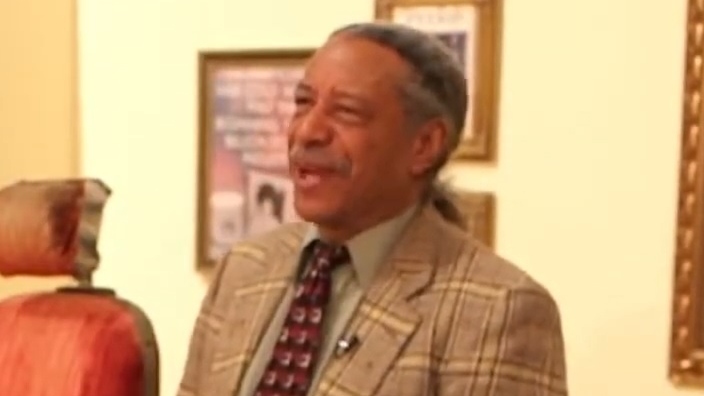Willie Lee Morrow, barber who made Afro pick popular and inspired the Jheri Curl, has died
Morrow, the inventive son of Alabama sharecroppers, died last month at his home in San Diego of pneumonia. He was 82.
The barber who pioneered many of the hair care products that became an iconic part of the Black community has passed away at 82.
Willie Lee Morrow, the inventive son of Alabama sharecroppers, died late last month at his home in San Diego, California, of pneumonia, according to The New York Times.

Morrow was also a Black media pioneer, founding San Diego’s first Black radio station in 1979 and The San Diego Monitor newspaper seven years later. His salon — which he acquired by buying out its owner for $5,000 — later expanded to take over an entire block, where a towering 10-foot Afro pick stood out front and San Diego’s Black community considered home.
In the 1960s, Morrow created a tool that he called the Afro Tease. It later became known as the Afro pick, one of Black America’s most iconic hair care products.
Morrow was a barber in San Diego when Robert Bell, a friend of his, returned from studying abroad in Nigeria, according to The Times. Bell brought him a gift: A traditional wooden comb with lengthy, inflexible tines spaced apart that was perfect for styling Black hair. The year was 1962, and Morrow, already a successful entrepreneur, found himself enthralled with the comb at a time when African Americans were styling their natural hair — and as The Times notes, “eager to assert their freedom from oppressive aesthetics” — during the rise of the Black Power movement.
“The Afro caught everybody off guard,” Morrow told Ebony magazine in 1970. “Even Black barbers and beauticians in America were caught lacking the knowledge as well as the desire to style a decent Afro.”
Morrow decided to fine-tune his own version of his gift and eventually made seven different models of the Afro pick. At one point, he sold more than 12,000 a week.
“Until fairly recently, the Black person was self-conscious about his curly, kinky hair,” he told The Times in 1971. “He or she would spend a fortune trying to take the curl out. That made it easy for the military. They would simply run the clippers closely over a Negro’s head — no problem at all.”
Morrow was so good at his work that he was given a contract by the Department of Defense to train thousands of barbers and beauticians to style Black hair. He eventually visited bases around the world and would later claim to be the youngest person to ever rack up a million miles flying Delta Air Lines, according to The Times.
The next decade, he toiled crafting products meant to soften and straighten Black hair’s naps, eventually creating Tomorrow Curl, which grew in popularity by the late ’70s when it became California Curl. That chemicalized soft, shiny Black hair style, later co-opted by mainstream hairstylist Jheri Redding, became known as the Jheri Curl.
Morrow also wrote more than a dozen books, mostly hair care manuals, including The Principles of Cutting and Styling Negro Hair in 1966. In 1973, he wrote a hair care history book, 400 Years Without a Comb, which traced the story of Black hair care from Africa through slavery to current times.
The trailblazer is survived by his wife, Gloria (Lacy) Morrow, and two daughters, Cheryl and Angela. He was preceded in death by a son, Todd.
TheGrio is FREE on your TV via Apple TV, Amazon Fire, Roku, and Android TV. Please download theGrio mobile apps today!


